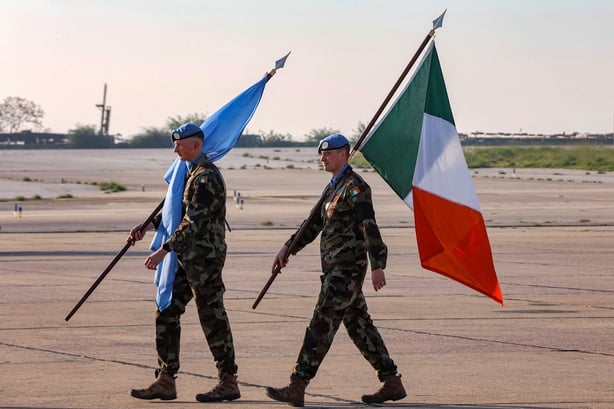Tánaiste and Minister for Defence Micheál Martin has paid tribute to Private Seán Rooney in the Dáil on the first anniversary of his killing while on a UN peacekeeping mission in Lebanon.
He said Private Rooney was "full of courage" but his "life was cut short in the noble pursuit of peace".
The 24-year-old Irish peacekeeper was killed when the armoured vehicle he was travelling in came under attack near the south Lebanon border.
His peacekeeper colleague Trooper Shane Kearney was seriously wounded.
In the hours after Private Rooney's death, the government announced that three parallel investigations would take place – one by the Irish authorities, another by the United Nations and a third by the Lebanese authorities.
To date, no findings from any of the investigations have been released.
Judicial proceedings in Lebanon are ongoing.
A spokesperson for UNIFIL, the UN peacekeeping mission in South Lebanon that Private Rooney was serving with, told RTÉ News that they had concluded their report and sent a copy to the Irish government.
But the Department of Defence told RTÉ News it was not possible to share the findings publicly.
A Department spokesperson added that the United Nations also undertook a Board of Inquiry, which had now concluded.
"As this is an internal report of the United Nations, it may not be shared with third parties or made public in any form, either in whole or in part," the spokesperson said.
"Though shared with Ireland for official use only, the final report of the Board of Inquiry will not be published.
"Separately, An Garda Síochána is conducting an ongoing investigation for the purposes of preparing a report for the Coroner."
UN officials confirmed to RTÉ News that the results of the UN Board of Inquiry would not be released.
As for the Lebanese authorities, seven men were indicted in criminal proceedings in connection with the case.
So far only one man has appeared in court. But last month, he was released on bail, reportedly on health grounds.
Another hearing is due to take place on Friday, but it is far from certain if any of the defendants will appear.

Asked how the Government would ensure accountability for the killing of Private Rooney, a spokesperson for the Department of Defence said that the Tánaiste Micheál Martin had "stressed his determination to ensure that justice is served for Private Rooney’s killing in a number of meetings with his Lebanese Defence and Foreign Minister counterparts over the last year".
"Representatives from the Embassy in Cairo and the Consulate in Beirut have attended all hearings to date and the Department of Defence has engaged a Lebanese legal firm to represent the State’s interests," the spokesperson said.
The UN’s head of the Peace Operations, Jean-Pierre Lacroix said that the UN would be paying "very close attention" to the Lebanese judicial proceedings.
Mr Lacroix said that the UN would keep advocating for accountability for those who are responsible for the killing of Private Rooney.
But in the absence of any public information about the investigations, it was important to ensure accountability and that "nothing is swept under the carpet," Louth TD Ruairí Ó Murchú, who raised a parliamentary question on the matter, told RTÉ News.
There was "not much point having an investigation unless we know the outcome," Mr Ó Murchú said.
"We need to ensure that everything that needs to be learnt, is learnt," he added.
The anniversary of Private Rooney’s death comes at time of heightened tensions along the Israel-Lebanon border. Daily exchanges of fire have increased the risks for peacekeepers on the ground, according to a spokesperson for UNIFIL.
But it is also a moment when Ireland is changing its approach to UN peacekeeping.
The government wants to scrap the "the triple lock" which requires a mandate from the UN Security Council to deploy more than 12 Irish troops, arguing that permanent members of the Council (China, Russia, US, France and UK) shouldn’t have a "veto" over where and when Ireland sends its own defence forces. But the move has been sharply criticised by neutrality campaigners.
The divided Security Council has not agreed a new peacekeeping mandate since 2014. Even debates around mandate renewals are increasingly fraught.
Peacekeepers are also facing increasing hostility from host states.
The UN’s mission to Mali was recently forced to leave, following a request from the Malian authorities.
Mr Lacroix told RTÉ News that the situation in Mali mirrored the logistical and security challenges peacekeepers are facing in many other places.
"In addition to all these challenges is the impact of global terrorism and the difficulty for a peacekeeping operation, even a robust peacekeeping operation, to deal with terrorism," he said.
Dealing with terrorism implies peace enforcement which is not what the UN should be involved in, he told RTÉ News.
"Peace enforcement is essentially waging war," he said, "and that is something that other organisations should do because the UN does not."
Despite the proposed removal of the Triple Lock, Mr Lacroix said he believed Ireland would remain committed to UN peacekeeping.
At the recent ministerial conference on UN peacekeeping held in Accra, Ghana, Ireland pledged additional troops to UNIFIL as well as around $470,000 in funding for UN peacekeeping training and support schemes.
Mr Lacroix said that UN peacekeeping would need the support of contributing countries as it adapts to a more challenging global context.
"This is something that we will be able to achieve only with the cooperative work of member states, particularly with Ireland and others that have been committed to peacekeeping since the creation of these operations," he said.







